Important Facts About Criminal Background Checks in Hawaii
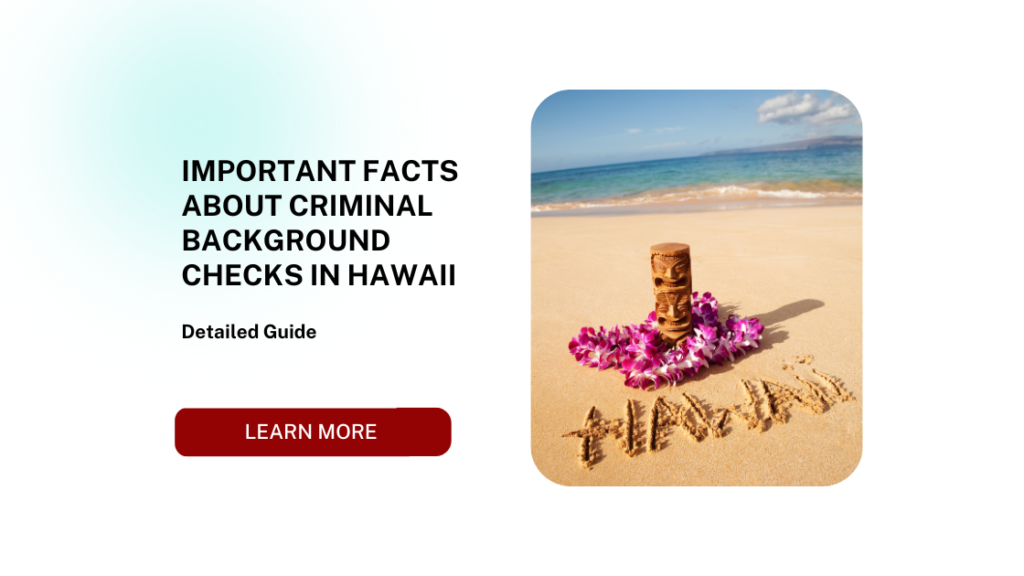
Hawaii Criminal Background Check: A Comprehensive Introduction
Criminal background checks are a crucial element in today’s society, serving as a foundation for safety, trust, and informed decision-making. Whether you are an employer looking to hire, a landlord screening tenants, or an individual seeking to verify personal information, a Hawaii criminal background check offers a detailed review of an individual’s legal history. This guide provides an in-depth exploration of what these checks are, why they matter, and how they function specifically within Hawaii’s legal and procedural framework.
What is a Hawaii Criminal Background Check?
A Hawaii criminal background check involves reviewing an individual’s criminal history through records maintained by the state. These checks are conducted to assess past behavior, legal compliance, and potential risks associated with an individual. In Hawaii, these records are managed and made available by the Hawaii Criminal Justice Data Center (HCJDC), a state agency that oversees the maintenance and distribution of criminal history records.
The Importance of Criminal Background Checks in Hawaii
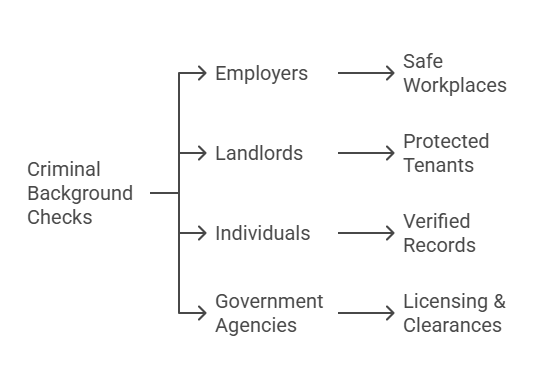
Criminal background checks are essential for:
- Employers: To ensure safe workplace environments and hire candidates with trustworthy histories.
- Landlords: To protect existing tenants and safeguard rental properties.
- Individuals: To verify personal records, especially when applying for jobs or licenses.
- Government Agencies: For licensing and security clearances.
By conducting these checks, organizations and individuals can mitigate risks, make informed decisions, and comply with federal and state regulations.
What Does a Hawaii Criminal Background Check Include?
Hawaii criminal background checks provide comprehensive information, including:
- Arrest Records: Documented instances where an individual was taken into custody, regardless of whether charges were filed.
- Conviction Records: Details of court rulings for misdemeanors and felonies.
- Outstanding Warrants: Active legal warrants tied to the individual.
- Court Records: Information on criminal cases, including charges, outcomes, and sentencing.
- Sex Offender Registry: Verification of whether an individual is listed on Hawaii’s sex offender registry.
The Role of the Hawaii Criminal Justice Data Center (HCJDC)
The HCJDC is the primary entity responsible for maintaining criminal records in Hawaii. It ensures that these records are accurate, up-to-date, and accessible to authorized parties.
Services Provided by HCJDC:
- Criminal History Record Checks: Available for employers, government agencies, and individuals.
- Fingerprinting Services: Used for detailed background checks, particularly in industries like healthcare and education.
- Online and In-Person Record Requests: Flexible options for obtaining criminal history reports.
Key Components of a Hawaii Criminal Background Check
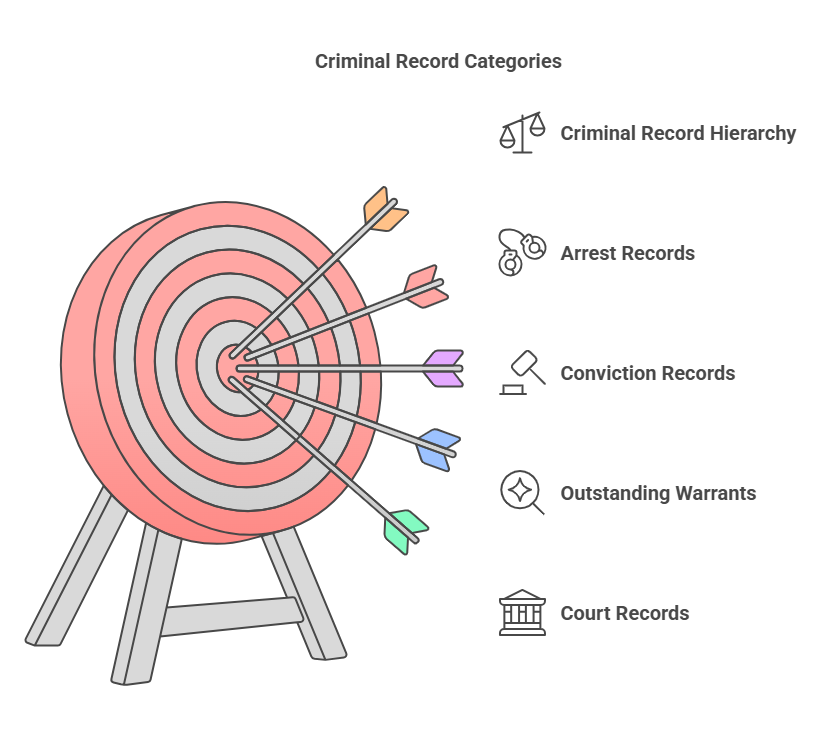
Understanding what a criminal background check entails is vital for interpreting the information it provides. Below are the primary components included in these checks:
1. Arrest Records
Arrest records document instances where an individual was detained by law enforcement. It is important to note that arrests do not always lead to convictions, and an individual may not be guilty of the charges associated with an arrest.
2. Conviction Records
Conviction records detail instances where an individual was found guilty of a crime in court. These may include:
- Misdemeanors: Less severe offenses, such as petty theft or disorderly conduct.
- Felonies: Serious crimes, such as robbery or assault.
3. Outstanding Warrants
This section highlights any unresolved legal warrants issued for an individual’s arrest.
4. Court Records
Court records provide additional context to an individual’s criminal history, including:
- Charges Filed
- Case Outcomes
- Sentencing Details
5. Sex Offender Registry
Hawaii maintains a public sex offender registry that identifies individuals convicted of sex-related crimes. This is a critical component for jobs and housing decisions where safety is a top priority.
Common Uses of Criminal Background Checks in Hawaii
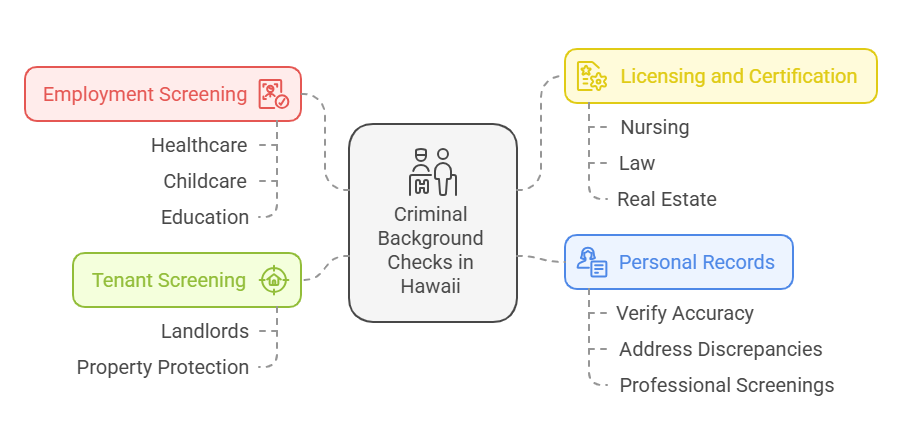
Criminal background checks are widely used across various sectors in Hawaii, including:
- Employment Screening
Employers in Hawaii often conduct background checks to ensure the safety and integrity of their workforce. Industries such as healthcare, childcare, and education are particularly stringent, given their responsibility for vulnerable populations. - Tenant Screening
Landlords rely on criminal background checks to evaluate potential tenants, ensuring a secure living environment for other residents and protecting property assets. - Licensing and Certification
Certain professions, such as nursing, law, and real estate, require clean criminal records as part of the licensing process. - Personal Records
Individuals may request their criminal history to verify accuracy, address discrepancies, or prepare for professional screenings.
How Are Criminal Background Checks Conducted in Hawaii?
Criminal background checks in Hawaii can be conducted through the HCJDC in the following ways:
1. Online Requests
- Visit the official HCJDC website.
- Complete the request form by providing necessary details such as name, date of birth, and other identifiers.
- Pay the applicable fee (typically $25 per search).
- Access the report electronically.
2. In-Person Requests
- Visit the HCJDC office located in Honolulu.
- Submit a manual request form along with valid identification.
- Pay the processing fee and specify whether you prefer to receive the report in person or by mail.
3. Third-Party Services
Professional background check providers like Exact Background Checks streamline the process, offering fast, accurate, and compliant screening services.
Summary of Key Components in a Hawaii Criminal Background Check
| Component | Details | Relevance |
|---|---|---|
| Arrest Records | Documented arrests, regardless of case outcomes. | Helps identify behavioral patterns. |
| Conviction Records | Details of misdemeanors and felonies. | Assesses legal accountability. |
| Outstanding Warrants | Active legal warrants tied to the individual. | Identifies unresolved legal obligations. |
| Court Records | Charges, outcomes, and sentencing details. | Provides case-specific context. |
| Sex Offender Registry | Verification against Hawaii’s public registry. | Ensures safety for sensitive environments. |
Challenges in Criminal Background Checks
Criminal background checks are not without challenges. Common issues include:
- Incomplete Records: Missing data can result in an inaccurate assessment.
- Outdated Information: Delays in updating databases can lead to discrepancies.
- Discrimination Risks: Misusing information from background checks can lead to legal liabilities.
Solutions include:
- Working with reputable providers like Exact Background Checks.
- Regularly updating records to ensure accuracy.
The Importance of Responsible Background Checks
Hawaii’s criminal background checks are critical tools for fostering safety and trust. Whether you’re an employer, landlord, or individual, understanding the key components, processes, and regulations of these checks ensures informed and fair decisions.
Conducting and Utilizing Criminal Background Checks in Hawaii
Criminal background checks are an essential tool for maintaining safety and compliance in various sectors, from employment to housing. In Hawaii, conducting a thorough criminal background check requires understanding the processes, regulations, and practical applications. This section delves into the step-by-step procedures for obtaining a criminal background check, the costs and timeframes involved, and the ways these checks are used effectively by employers, landlords, and individuals. Additionally, it addresses the role of compliance and professional services, such as Exact Background Checks, in simplifying and optimizing the process.
How to Request a Criminal Background Check in Hawaii
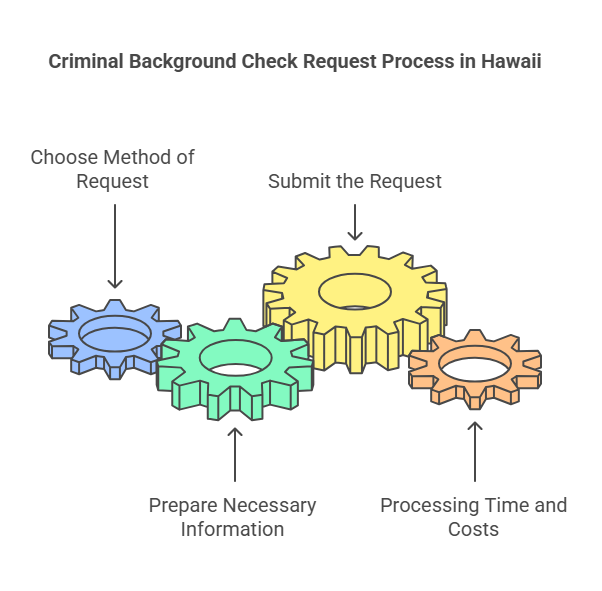
Conducting a criminal background check in Hawaii is straightforward but requires adherence to state protocols. Below is a step-by-step guide on how to request a criminal background check.
1. Choose the Method of Request
In Hawaii, background checks can be requested through the Hawaii Criminal Justice Data Center (HCJDC) via three main methods:
- Online Requests: Convenient and efficient for most users.
- In-Person Requests: Suitable for those requiring physical documentation or additional assistance.
- Third-Party Services: Professional background screening companies streamline the process, ensuring accuracy and compliance.
2. Prepare Necessary Information
To request a background check, you need to provide:
- Full name of the individual.
- Date of birth.
- Additional identifiers (e.g., Social Security Number, if applicable).
- Valid photo identification for in-person requests.
3. Submit the Request
- Online Requests: Visit the HCJDC’s website, complete the online form, and pay the processing fee.
- In-Person Requests: Fill out the request form at the HCJDC office, present identification, and submit payment.
- Through a Third Party: Share the required details with the screening service, which handles the request on your behalf.
4. Processing Time and Costs
- Cost: The fee for a standard criminal background check in Hawaii is typically $25 per search. Additional fees may apply for fingerprinting or specialized reports.
- Processing Time:
- Online requests are usually processed within 1–2 business days.
- In-person requests may take up to a week, depending on volume.
- Third-party services like Exact Background Checks often expedite the process.
The Relevance of Criminal Background Checks in Hawaii
Criminal background checks serve various purposes in Hawaii, offering value to employers, landlords, and individuals alike.
1. Employment Screening
Employers in Hawaii are required to create safe, compliant workplaces. Criminal background checks are especially relevant in:
- Healthcare: Ensuring the safety of patients and staff.
- Education: Screening for roles involving children and vulnerable populations.
- Financial Services: Maintaining trust and mitigating fraud risks.
- Hospitality and Tourism: A key industry in Hawaii, where trustworthiness is paramount.
2. Tenant Screening
Landlords use criminal background checks to evaluate prospective tenants, ensuring:
- The safety of other residents.
- Reduced risk of property damage.
- Compliance with housing laws.
3. Licensing and Certifications
Certain professional licenses in Hawaii, such as nursing, teaching, or real estate, require clean criminal records. State boards often mandate background checks as part of the licensing process.
4. Personal Use
Individuals may request their criminal background to:
- Verify accuracy.
- Prepare for job applications.
- Address inaccuracies or outdated information.
Hawaii’s “Ban the Box” Law and Employment Practices
Hawaii’s “Ban the Box” law is designed to reduce discrimination against individuals with criminal records. It prohibits employers from inquiring about an applicant’s criminal history until a conditional job offer is made.
Key Provisions of the Law:
- Employers must conduct criminal background checks only after making a conditional job offer.
- Arrests that did not result in a conviction cannot be considered.
- Convictions older than seven years (excluding periods of incarceration) are typically off-limits unless directly related to job duties.
Implications for Employers:
- Employers must carefully document their hiring process to ensure compliance.
- Violations of the “Ban the Box” law can result in legal penalties and reputational damage.
The Role of Exact Background Checks in Simplifying the Process
Exact Background Checks provides tailored services for individuals and businesses in Hawaii, ensuring accurate and compliant background screenings.
1. Streamlined Process
Exact Background Checks simplifies the request process by handling all necessary documentation and submissions.
2. Comprehensive Reports
Their services go beyond basic checks, offering:
- Criminal history.
- Employment verification.
- Education verification.
- Drug testing.
3. Legal Compliance
Exact Background Checks ensures adherence to Hawaii-specific laws, such as the “Ban the Box” initiative and the Fair Credit Reporting Act (FCRA).
4. Accuracy and Reliability
With advanced tools and a commitment to quality, Exact Background Checks reduces the risks of incomplete or outdated reports.
Tips for Interpreting Criminal Background Reports
When reviewing a criminal background report, consider the following:
- Contextual Understanding
Not all criminal records indicate ongoing risk. Employers and landlords should consider the nature of the offense, time elapsed, and relevance to the job or tenancy. - Look for Patterns
Repeated offenses may indicate a higher level of risk compared to isolated incidents. - Check for Errors
Ensure the report’s accuracy by cross-verifying details. Discrepancies should be addressed promptly. - Use Professional Services
To minimize errors and ensure compliance, leverage professional screening services like Exact Background Checks.
Common Challenges and Solutions in Background Checks
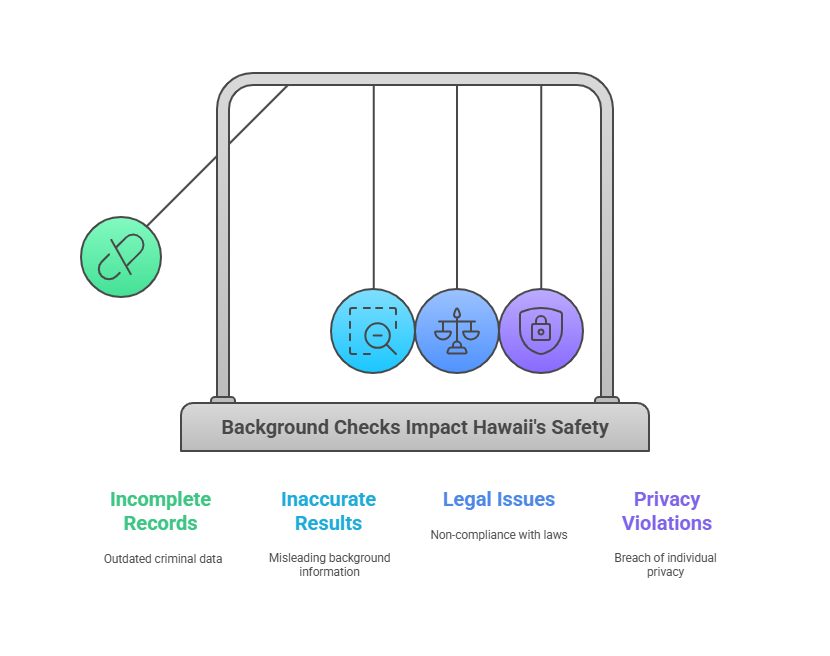
Despite their importance, conducting background checks in Hawaii can present challenges.
1. Incomplete Records
Criminal databases may not always be up-to-date, leading to inaccuracies.
- Solution: Use professional services with access to comprehensive databases.
2. Legal Compliance
Understanding and adhering to Hawaii’s unique laws can be complex.
- Solution: Partner with screening providers familiar with Hawaii-specific regulations.
3. Privacy Concerns
Background checks must balance safety with respect for individual privacy.
- Solution: Limit inquiries to job-relevant information and obtain consent.
DIY vs. Professional Background Checks
| Aspect | DIY Background Check | Professional Screening |
|---|---|---|
| Accuracy | Risk of errors due to incomplete records | High accuracy with comprehensive data |
| Legal Compliance | Requires knowledge of laws | Ensures compliance with FCRA and Hawaii laws |
| Processing Time | Can be slower | Faster results with advanced tools |
| Cost | Lower upfront costs | Cost-effective with added reliability |
| Convenience | Time-consuming | Hassle-free process managed by experts |
The Importance of Accuracy and Fairness
Criminal background checks, when done responsibly, foster safety and trust. However, errors or misuse can result in discrimination, reputational harm, or legal penalties.
Best Practices for Accuracy:
- Use reputable screening services.
- Review reports for completeness and accuracy.
- Respect individuals’ rights to access and dispute their records.
Criminal background checks are a vital part of maintaining safety and compliance in Hawaii. Understanding the processes, laws, and challenges ensures that these checks are used effectively and ethically. In the next section, we’ll cover the legal aspects, answer common questions, and summarize the key points discussed so far. Stay tuned for a detailed exploration of how to navigate Hawaii’s criminal background checks responsibly.
Legal Aspects of Hawaii Criminal Background Checks
Legal compliance is crucial when conducting background checks, as violations can lead to lawsuits, fines, or reputational damage. Below, we explore the key laws and regulations that shape Hawaii’s criminal background check processes.
1. The Fair Credit Reporting Act (FCRA)
The FCRA governs how consumer information, including criminal background reports, is collected, used, and shared. Compliance with FCRA is mandatory for employers, landlords, and screening companies.
Key Provisions:
- Written Consent: Employers and landlords must obtain written consent before conducting a background check.
- Disclosure Requirements: Individuals must be informed if adverse action (e.g., denial of employment) is taken based on the report.
- Dispute Rights: Individuals have the right to dispute inaccuracies in their reports.
Implications for Businesses:
Non-compliance with the FCRA can result in lawsuits and financial penalties. Working with professional services, such as Exact Background Checks, ensures adherence to these regulations.
2. Hawaii’s “Ban the Box” Law
Hawaii was one of the first states to implement “Ban the Box” legislation, which restricts when employers can inquire about an applicant’s criminal history.
Key Provisions:
- Employers cannot ask about criminal history until after a conditional job offer is made.
- Only convictions relevant to the job role can be considered.
- Arrests not leading to convictions and convictions older than seven years (excluding incarceration) are generally off-limits.
Employer Responsibilities:
- Document hiring decisions to demonstrate compliance.
- Avoid blanket bans on individuals with criminal records.
3. Hawaii Criminal Justice Data Center (HCJDC)
The HCJDC is the primary state agency responsible for maintaining and providing access to criminal records. It operates under strict confidentiality guidelines to protect individuals’ privacy.
Key Functions:
- Maintaining the Adult Criminal Conviction Information (eCrim) system.
- Processing fingerprint-based checks for licensing and employment.
- Ensuring data accuracy and compliance with state laws.
4. Data Privacy Laws
Hawaii emphasizes the protection of personal data in background checks. Businesses must:
- Limit access to criminal records to authorized personnel.
- Securely store and dispose of sensitive information.
Violations:
Failure to protect data can lead to penalties under state privacy laws and the FCRA.
FAQs: Answering Common Questions About Hawaii Criminal Background Checks
What Information Appears on a Hawaii Criminal Background Check?
A Hawaii criminal background check typically includes:
- Arrest records (if they lead to conviction).
- Convictions (misdemeanors and felonies).
- Outstanding warrants.
- Sentencing details (e.g., probation, incarceration).
Exceptions:
Arrests not leading to convictions and expunged records are excluded.
Can an Employer Deny Me a Job Because of My Criminal Record in Hawaii?
Yes, but only under specific conditions:
- The conviction must be relevant to the job.
- The employer must comply with the “Ban the Box” law.
Employers are encouraged to assess the nature and timing of offenses rather than imposing blanket rejections.
How Can I Correct Errors in My Hawaii Criminal Background Check?
Individuals can dispute inaccuracies by contacting the HCJDC or the third-party screening company that provided the report.
Steps to Correct Errors:
- Obtain a copy of the report.
- Identify inaccuracies and gather supporting evidence.
- Submit a formal dispute to the reporting agency.
How Far Back Do Criminal Background Checks Go in Hawaii?
Hawaii’s laws limit the lookback period for convictions to seven years (excluding incarceration periods). Employers and landlords must adhere to these restrictions unless federal regulations override state law (e.g., in healthcare or childcare roles).
Why Should Businesses Use Exact Background Checks for Screening Services?
Exact Background Checks simplifies the background screening process, ensuring accuracy, compliance, and efficiency.
Benefits of Choosing Exact Background Checks:
- Comprehensive reports covering criminal history, employment, and education verification.
- Compliance with Hawaii-specific laws and FCRA guidelines.
- Access to advanced tools for quick and accurate results.
The Importance of Compliance and Ethical Practices
Criminal background checks play a critical role in safeguarding workplaces, rental properties, and licensing processes. However, misuse or non-compliance can lead to serious consequences, including discrimination claims and legal actions.
Best Practices for Compliance:
- Obtain written consent before conducting checks.
- Limit inquiries to job-relevant convictions.
- Provide applicants with a chance to explain or dispute findings.
- Partner with professional screening services like Exact Background Checks.
Conclusion: Key Takeaways and Recommendations
Hawaii criminal background checks are a vital tool for promoting safety, transparency, and compliance across various sectors. Here’s a summary of the key points covered in this article:
- Thorough Process: Conducting background checks in Hawaii requires understanding state-specific laws, such as the “Ban the Box” initiative and the FCRA.
- Value in Various Contexts: Background checks are indispensable for employers, landlords, and licensing authorities.
- Challenges and Solutions: Common challenges, such as incomplete records or legal compliance, can be addressed by partnering with professional services.
- Ethical Practices: Fair and responsible use of background checks protects individuals’ rights and minimizes legal risks.
Exact Background Checks offers reliable, compliant, and efficient services tailored to Hawaii’s unique needs. By choosing a professional partner, businesses and individuals can ensure accuracy, fairness, and peace of mind in their background screening processes.
For trusted criminal background check services in Hawaii, contact Exact Background Checks today. Safeguard your decisions and prioritize safety with expert assistance you can rely on.



